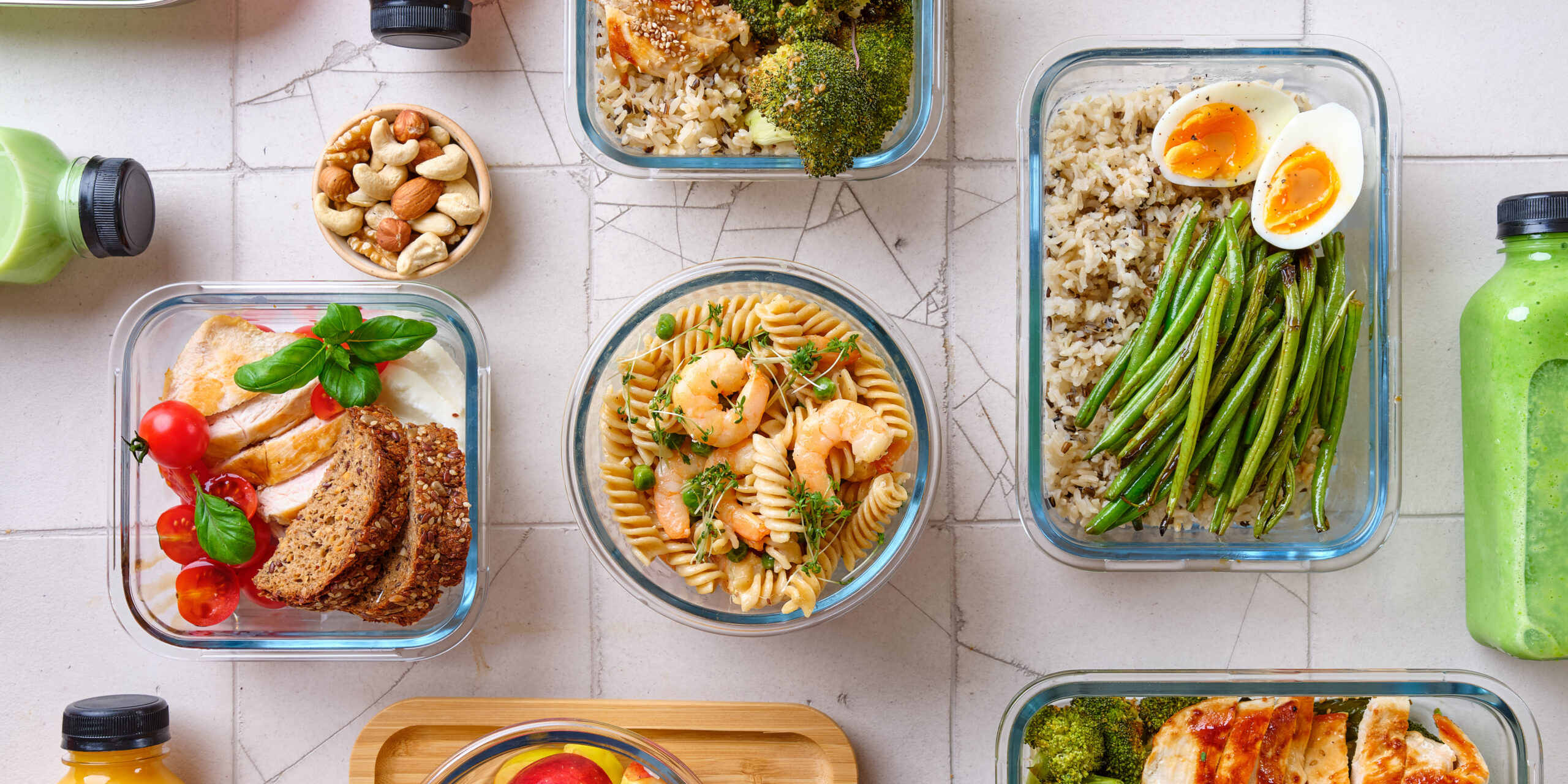Meal planning for your overall wellness should be a top priority! You eat every single day, multiple times a day. There is no reprieve from the numerous steps involved in preparing food—washing, chopping, slicing, mixing, heating—and the clean-up afterward. It’s no surprise that meal kit delivery services and Uber Eats have flourished. I
n 2020, the global meal kit market was valued at $10.26 billion and the industry is expected to see a 13% compound annual growth rate between now and 2028.[1]
The modern approach to meal preparation is in striking contrast to our early human ancestors, for whom foraging, growing, and hunting food was their most important priority. Skipping ahead to 1965, when cooking was still largely a woman’s responsibility, about 2 hours a day was spent in the kitchen.[2]
Nowadays, the average person spends a total of 37 minutes a day on food preparation and cleanup.[3]
With all the conveniences available to us, there isn’t a need to invest hours making meals, but a 2014 study published in the American Journal of Preventive Medicine found that people who spent more time on home food preparation ate a better quality diet, with a significantly higher intake of vegetables, salads, and fruits than those who relied on convenience foods.[4] The study also found that those who spent less time on food preparation spent considerably more money on fast-food restaurants.
Excluding breakfast, which is typically straightforward to prepare, mainly because the options are limited, you eat 14 meals each week (seven lunches and seven dinners). But that doesn’t mean that you have to prepare 14 separate meals. A few simple time-saving strategies can help you get organized and prioritize healthy eating.
Prioritizing Healthy Meal Preparation
Meal prepping has become a popular practice for individuals seeking convenience, organization, and improved nutrition. Here are five benefits of meal prepping that can positively impact your lifestyle:
Save time with meal planning
Meal prepping saves you precious time throughout the week. By dedicating a few hours to preparing meals in advance, you can significantly reduce the time spent on cooking and food preparation on busy weekdays. With pre-portioned and ready-to-eat meals, you can grab and go, eliminating the need for daily cooking and cleaning.
Consistent Nutrition with Meal Planning
Meal prepping allows you to have better control over your nutritional intake. By planning and preparing your meals in advance, you can ensure that your choices align with your health goals. You have the opportunity to include a variety of nutrient-dense ingredients, balance your macronutrients, and control portion sizes. This consistency promotes a well-rounded and nourishing diet. This could eliminate the need for nutritional supplements which will also save you money!
Portion Control
Portion control is an essential aspect of maintaining a healthy diet. Meal prepping enables you to portion out your meals and snacks ahead of time, preventing overeating or mindless snacking. By having pre-portioned meals readily available, you can stick to your desired calorie or macronutrient targets, supporting weight management and overall health. For more information about meal planning for weight loss check out this blog by Catering with a Twist.
Financial Savings
Meal prepping can lead to financial savings in the long run. By planning your meals and grocery shopping strategically, you can minimize food waste and save money by buying ingredients in bulk or taking advantage of discounts. Additionally, by bringing your pre-prepared meals to work or school, you can avoid costly takeout meals and unnecessary impulse purchases.
Stress Reduction
One of the often overlooked benefits of meal prepping is the reduction of daily stress. By having your meals planned and prepared, you eliminate the last-minute decision-making and uncertainty about what to eat. This alleviates the stress associated with mealtime and frees up mental energy for other important aspects of your life.
Eat Clean with Meal Planning
It is important to know where our food comes from & how it is grown. Meal prepping our own food gives us the opportunity to not only choose healthier, whole foods, but also making sure it is environmentally friendly. Choosing local, organic foods have many health benefits and environmental benefits. Unfortunately the way that industrial agriculture grows and raises food, is not ideal. Levelling up the quality of our food is further going to support other health goals.
Keep a running list of your favourite meals.
Coming up with what to make for dinner after a long workday can be a more onerous task than the cooking process itself, especially when you’re low on ingredients. A handy list of your favourite go-to meals, recipes you’ve prepared and enjoyed, or recipes you would like to try will save you time and frustration and help you with weekly meal planning. Divide your list for easy reference: plant-based, kid-friendly, holiday meals, etc., and add to the list whenever you come across a new recipe you might like to try.
Keep your list within reach—on your mobile device, home computer, or if you prefer, store your list and recipes in a decorative box in the kitchen. Include a link to online recipes or record the recipe right onto your list to avoid wasting time looking for it. Some recipe manager apps to check out include Paprika and The Recipe Manager.
Plan a menu for the week
This important step saves time, money, and food waste since you can make use of leftovers for the next day’s meal. Preparing a weekly meal plan also means you’re less likely to stop for take-out.
On the weekend or a quiet weeknight, brainstorm lunches and dinners for the upcoming week. If you don’t know where to start, consider weekly themes. Choose two to three themes to repeat each week for the next month and select others from the list when you need inspiration.
A variety of printable menu planning templates like this one can be found on Pinterest, or try a meal planning app like Mealime.
Prepare a grocery list from your weekly menu. A list reduces visits to the supermarket and unnecessary spending. Record the list on your mobile device to ensure it goes to the grocery store with you, or use a shopping list app like Listonic. If you’d rather do things the old-fashioned way and prefer to keep a written list on your fridge, don’t forget to snap a photo before heading out for groceries.
When pressed for time, shop online. Another option is to join an organic food co-op that delivers a box of locally grown organic groceries right to your door.
Prep on weekends. Spend some time on Sunday afternoon preparing base ingredients for the upcoming week. Chop raw vegetables, cook a large pot of quinoa or brown rice, steam sweet potatoes, boil a carton of eggs, and make a large bean salad to eat throughout the week. Opening your fridge to find containers of prepared ingredients that you can easily combine to make a layered salad or stir-fry will save a lot of time and stop you from ordering in.
Keep meals simple when meal planning
Centre your dish around protein, aiming for 20 to 30 grams per meal. Add colorful vegetables or a large salad, and a small amount of fiber-rich starchy carbs if desired (like sweet potatoes or quinoa). Instead of spending time slicing 6 different types of vegetables, add nutrients to meals by sprinkling:
Raw nuts,
mineral-packed sea vegetables
Hemp hearts
Dried fruit onto your main dish or vegetables
The probiotics in just a forkful of kimchi, sauerkraut or another fermented vegetable are beneficial to your microbiome and will do more for your health than a side of overcooked green beans.
This should go without saying, but there is no need to make every dinner Instagram-worthy.
Cook to have leftovers and containerize. Make double batches of each recipe and containerize the extra food for another day. Freezing entire meals in freezer-safe containers will give you a few nights off from cooking.
Meal prepping can simplify your life, promote healthier eating habits, and contribute to your overall well-being. By investing a little time and effort upfront, you can enjoy the many benefits of having nutritious and convenient meals. Start small. Experiment with different recipes and techniques. 🍽️🌱
BETA-CAROTENE BLAST SOUP
This recipe freezes well. Divide the finished soup into two batches, one for now and one to enjoy later.
½ lb carrots, chopped
1 small sweet potato, chopped
½ butternut squash, chopped*
1 clove garlic, minced
1 small onion, chopped
4 cups water, vegetable stock or bone broth
2 cups coconut milk or almond milk
½ tsp. nutmeg
¼ tsp. cloves
¼ tsp. sea salt
Directions:
- In a large pot, boil the water or stock on high heat.
- Add the carrots, potato, squash*, garlic, and onion. Cook until tender.
- Using a ladle, pour about 3 ladle’s-full of the vegetable mix with some of the stock into a blender. Add ½ cup of coconut or almond milk. Purée until well blended.
- Pour contents of blender into a large container.
- Continue this same process with the rest of the pot contents until all of the vegetables have been blended. Much of the water will remain in the pot. You can put this into a container and use it as vegetable stock in another recipe.
- When all of the soup has been puréed and is in a container, sprinkle in the spices and sea salt and mix with a spoon.
Serve hot or cold.
- Roast the butternut squash ahead of time to soften before cutting. To roast, poke holes in the squash with a sharp knife and bake on a baking sheet at 400F until tender.
[1] https://trulyexperiences.com/blog/meal-kits-industry-statistics/#What-is-a-Meal-Kit
[2] https://theflag.org/trivia/time-women-spend-cooking/
[3] https://www.ers.usda.gov/amber-waves/2016/november/americans-spend-an-average-of-37-minutes-a-day-preparing-and-serving-food-and-cleaning-up/
[4] https://www.sciencedirect.com/science/article/pii/S0749379714004000
Lynne is a Registered Holistic Nutritionist, meal prep mastermind, wife and mother of three. Lynne’s dreams and creativity have brought Holistic Nutrition Hub to fruition so that all Nutrition Practitioners can better help their clients and attain their business goals.




One Thought on “Meal Planning – 5 Benefits to Creating this Habit”